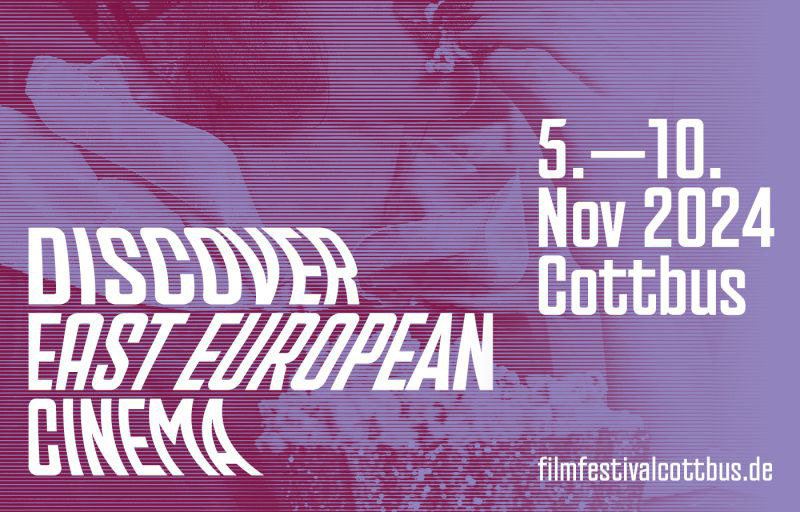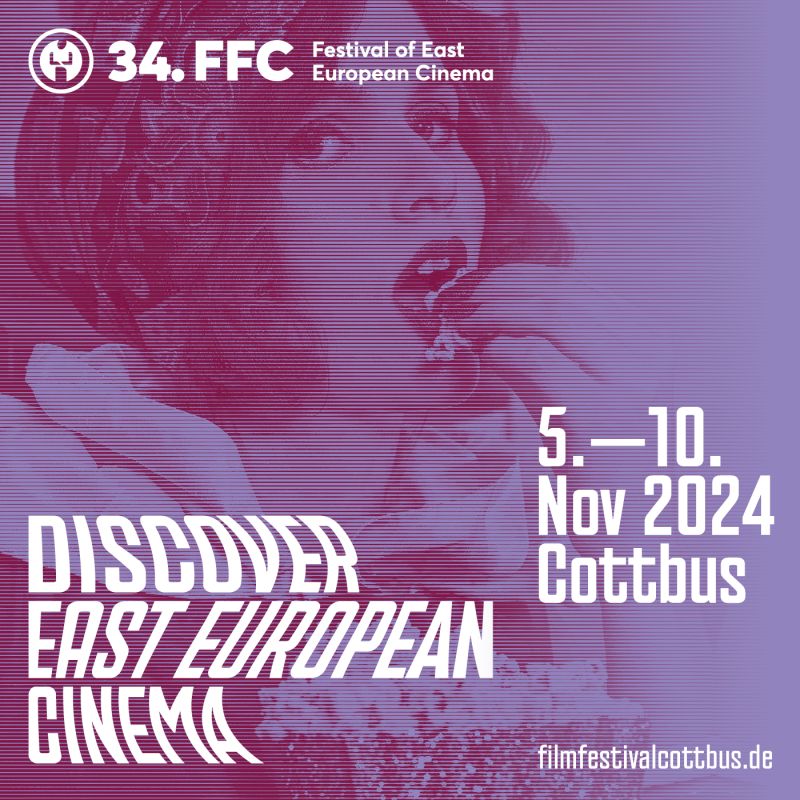Festival of Eastern European Film in Cottbus
The wide spectrum ranges from Ukrainian science fiction films to Kazakh Easterns, from Czech slaughter festival grotesques to refugee dramas from Serbia.
This year, the Brandenburg University of Technology Cottbus-Senftenberg (BTU) and the Film University Babelsberg "Konrad Wolf" are once again supporting the prize for the best debut film, which is endowed with a total of 3,000 euros.
BTU professor Dr Stefanie Kiwi Menrath is part of the jury for this category. She is a cultural anthropologist and cultural mediator. In practice and research, she is interested in cultural education in open settings, pop music cultures, radio/audio work & empowerment, transculturality and criticism of discrimination as well as the collaboration of art and science. She has been Professor of Media Pedagogy: Aesthetic Practice in Social Work at BTU Cottbus-Senftenberg since 2020. She is co-founder of the Initiative for a Free Radio for Cottbus and the AG Utopia Kulturelle Bildung.
Note for students: Students pay 30 euros for their accreditation. Registration is required at the following link: https://www.filmfestivalcottbus.de/de/service/akkreditieren.html.
All information about festival tickets
The opening film will be MY LATE SUMMER (HR/BA/RO/SI/RS) by Oscar winner Danis Tanović (NO MAN'S LAND) - a touching story full of heart, pain and nostalgic feelings in the late Mediterranean summer on a Croatian Adriatic island. The handful of people who meet there get closer to each other faster than they would like. The full programme is available on the festival website.
Competitions and programme highlights
Three competitions define the festival: the Feature Film Competition, the Short Film Competition and the U18 Youth Film Competition. In addition, there are seven further programme sectionsprogramme sections, which focus on the multifaceted filmmaking of Central and Eastern Europe. This year, audiences can look forward to a total of 78 premieres, including twelve world premieres and 60 German premieres.
In the Spectrum section, Eglė Vertelytė's TASTY (LT) will premiere simultaneously in Cottbus, Tallinn and Cork - a feel-good comedy about two friends who take part in a TV cookery competition. In WHEN WE RETURN (IL) (Specials section), filmmaker Vladimir Nepevny addresses the effects of the Russian war against Ukraine and the division of his own family through Russian propaganda. Another world premiere is the black comedy ETERNITY PACKAGE (BG/IT) (Spectrum), in which an undertaker struggles to survive in a corrupt small town. OLIARA (KAZ) is an Eastern film by Hungarian old master Tamás Tóth, which shows the brutal upheavals in Kazakhstan in the 1930s and thus sheds light on one of the most dramatic chapters in Kazakh history. This film is part of the new specials series MIDNIGHT MADNESS, in which serious topics are told with blatant genre motifs, resulting in highly exciting stories between folk legend and true core, old people's home and chainsaw, drug laboratory and nationalism gene.
The FFC presents seven Ukrainian feature-length and short films that represent the Ukrainian film scene with investigative power, everyday awareness, thoughtfulness and poetry, creatively dealing with the past, present and future despite the most adverse circumstances. These include the competition feature film entry U ARE THE UNIVERSE (UA), a sci-fi drama about loneliness in space, and I SEE THEM BLOOM (DE), a short film that provides insights into the lives of young Ukrainian women who have fled to Germany. The documentary STORIES FROM THE CELLAR (UA/USA) focuses on the trauma and the will to survive of Ukrainian children in the face of the Russian war of aggression. In addition, this year's festival Saturday will once again feature Ukrainian Day, on which Ukrainian citizens receive free admission to all films in the programme upon presentation of a valid Ukrainian passport.
In the section Close-Up section, the FFC is focussing on the film country Armenia this year. Audiences can look forward to original and courageous stories that address the country's turbulent history as well as current social discourse. The feature film AMERIKATSI (AM) by Michael A. Goorjian tells the story of Charlie, who is sent to prison after returning from the USA to the Soviet Union - a political tragicomedy characterised by longing, melancholy and black humour. In the animated documentation AURORA'S SUNRISE (DE/AM), Inna Sahakyan, a member of the FFC International Jury, sheds light on the harrowing survival story of Aurora Mardiganian, who escaped the Armenian genocide and then went to Hollywood. In THE WAR DIARY (FR/AM), director Hakob Melkonyan takes his grandfather's war diary on a journey through the conflict-ridden former USSR, linking the past with the realities of war today. The programme will be complemented by a master talk on Armenian cinema between past and present with director Inna Sahakyan. The Close-Up Armenia section is supported by the Federal Agency for Civic Education.
Another highlight of the festival is the series "The female gaze: New Films from the Czech Republic", curated by Lenka Tyrpáková. Eight feature-length and five short films by Czech female filmmakers are on the programme, including the feature film HER BODY (CZ/SK) by Natálie Císařovská, which tells the story of a high diver who switches to the porn industry after an injury. The series offers intimate portraits, animated journeys and humorous mockumentaries - female voices of Czech cinema to keep an eye on. The German-Czech Future Fund is funding this series.
In the section Eco East section, a wide variety of contributions ranging from feature films and documentation to science fiction and family drama will encourage us to reflect on the relationship between people and landscape. This will be complemented by the panel "Holiday by the Lake - Rethinking Industrial Landscapes in Brandenburg and the Baltic States" . The documentary film BURIAL (LT/NO) tells the story of the dismantling of the Ignalina nuclear power plant on Lake Drūkšiai on the Lithuanian-Belarusian border. After the screening, representatives of the film crews and the chief urban developer of the city of Cottbus, Doreen Mohaupt, will discuss the renaturalisation of former industrial landscapes under the moderation of environmental and climate expert Felix Jaitner. In his new film DRY SEASON (CZ/SK/DE), old master Bohdan Sláma also shows how the current climate dispute is causing rifts within families.
Sorbian, regional and international filmmaking meet in the section Homeland | Domownja | Domizna section. Current feature and documentary films as well as rediscovered treasures from archives will be shown here. Well-known names and newcomers explore the meaning of the word Heimat in a variety of ways. Two films by Donald Saischowa invite viewers to reflect on 35 years since the fall of the Berlin Wall. It quickly becomes clear that the images shown have lost none of their social relevance. In the short film programme Łužyca Shorts, filmmakers tell stories that move Lusatia. The film WUHLO (DE), the third part of the 12-year documentary long-term observation by Maja Nagel and Julius Günzel, will also celebrate its premiere at the FFC.
In addition, the well-known sections Spectrum and Hits sections, which offer exciting arthouse cinema, in-depth entertainment and comedy with brains. The children's programme is also back Kids at the cinemaprogramme, including a children's festival and the new fairytale film THE TALE OF THE SILVER BRIDGE by Cüneyt Kaya on the Sunday of the festival!
Date comment:
various venues in Cottbus


